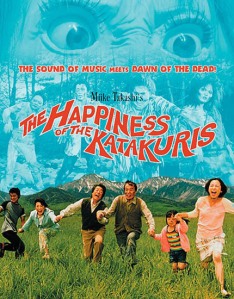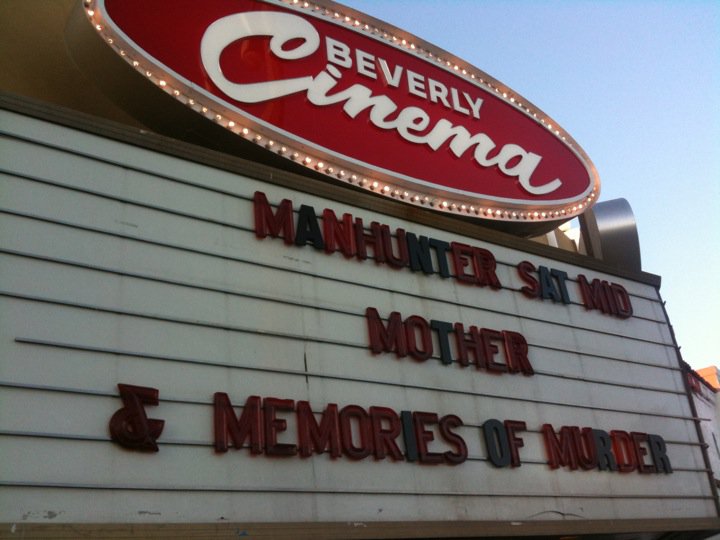This will be my last and final piece for the Korean Blogathon. It has been a pleasure to participate in it, and I can’t wait to watch a slew of the films that have been written about by everyone else! Thanks to everyone that put this together and to Martin for designing such a lovely page to showcase our writing! It’s been fantastic. So, in conclusion…..
I live in a city where everyone is obsessed with the motion picture industry. If you aren’t pitching a script or don’t have one on the backburner, then you’re on your way to a meeting or to meet with your agent. If not that, then you are location-scouting or bitching about budgets or other production issues. Yes, that’s right folks, I live in the Devil’s Playground- Hollywood, CA. I was born and raised here, and it’s what I know. Is it always what I enjoy? Not by a longshot. But it’s where I’m from, for better or for worse.
 In any case, try as I might, I was unable to get away from the cinema. It was like the siren’s call to me, although not in the same way as everyone else. While I fought anything and everything cinematic up until college (I was going to be a social worker, dammit!), I was unable to distance myself from the silver screen any longer, and got several degrees in it- but all in theoretical writing. Not as useful as building construction per se, but I loved it, and still do.
In any case, try as I might, I was unable to get away from the cinema. It was like the siren’s call to me, although not in the same way as everyone else. While I fought anything and everything cinematic up until college (I was going to be a social worker, dammit!), I was unable to distance myself from the silver screen any longer, and got several degrees in it- but all in theoretical writing. Not as useful as building construction per se, but I loved it, and still do.
Within my film education, I encountered several kinds of Asian cinemas from my professors- but never Korean cinema. So I became very fond of Japanese cinema, and Hong Kong cinema and different Chinese filmmakers. From there, it was all up to me. So, being a rather exploratory person, I dove in head-first and didn’t come up for air for a very, very, very long time.
The first filmmaker I fell for was Wong Kar-Wai. His films came highly recommended by a friend, and that friend could not have been more correct. They were beautiful, sensual, graceful and smart. Some were action-type films and still contained the afore-mentioned descriptions. Wong Kar-Wai sold me, and got me involved.
About the same time, I developed a keen fascination with the Japanese New Wave and wondered intensely why no one knew more about it or was writing more about it. From there, I found Kenji Mizoguchi and became deeply obsessed with his work as well. To compliment the highly sexualized New Wave and the historical-yet-feminist-tinged-Mizoguchi, I was then introduced to my first slightly Korean figure- Takashi Miike. While born in Japan, he was from an area that was dominated by Korean immigrants. In addition, his father was actually born in Seoul. Miike had multiple Korean connections, a fact I was not aware of until a little while ago. He was still, however, a Japanese filmmaker, more or less, and so I added him to my bundle. However, his style added to the New Wave and Mizoguchi really made the kettle start to boil.
Miike has been described as “controversial and prolific” (both of which he is) and his films have been described as being “perverse and extremely violent” and also “dramatic and family-friendly.” Watching Miike’s work made me interested in seeing what else the Asian world had to offer.

Takashi Miike's film "The Happiness of the Katakuris" (2001) was a remake of the Korean film "The Quiet Family" (1998) by Kim Ji-woon
It was not until much later that I became aware of Korean cinema and what it had to offer, but I have to say that the previous films mentioned were the items that whetted my appetite. J-horror and all of its various offerings was starting to get a little repetitous, tragically, and I was not always a fan of how perverse Miike could get. Or at least not his methodologies. It wasn’t my bag, baby.To quote Huey Lewis and the News, I was in the cinematic mindset of: “I want a new drug.”
And lucky for me, I found one: Korean cinema. While doing my research and writing for this blogathon, I remembered that the first Korean film I ever saw was Tell Me Something (1999). To be honest, I have to congratulate Chang Yoon-hyun. While I may forget things about movies I saw last week or last month, I saw this movie over 10 years ago and it still stuck with me. I have thought about the film over the last few years, not remembering the title, but vaguely sure of the storyline and definitely remembering the imagery, and always thinking: “Damn. I need to find that movie and see it again.” So thanks, Chang Yoon-hyun. I’ll be making that purchase soon.
Continuing onwards, what I have discovered about this country’s cinema is that it has the unique ability to pull the rug out from under me in every single movie I have seen. Just when I think I know what’s going on, I don’t. I can’t think of another country that does that as well as Korea. Really, sometimes the content itself pulls the rug out from under the viewers feet. Look at Oldboy!
But that is what I like the most about Korean cinema and why I cannot stop watching it. My good friend (and fabulous writer) Dennis Cozzalio just recently pointed me in the way of a Korean cinema in my city. The CGV. It looks great. Some American films with Korean subtitles and recent Korean films with English subtitles. It’s got a little cafe, apparently, and I happen to know that it is surrounded by really great (and inexpensive) local food establishments. I’m sold, hook, line and sinker.
When I saw Mother (2009) and Memories of Murder (2003) on a double bill at the New Beverly Cinema, all I could think was that Good Suspense Films had returned to the silver screen. Alfred Hitchcock would be proud. I could just imagine him, sitting in the back, smirking away. I was astounded at how good they were.
Every time I see a new piece of Korean filmmaking I am blown away. I’ve seen Kim Ji-woon’s I Saw The Devil twice now, and I finally feel like I may be ready to write something coherent on it. It’s a pretty fascinating piece to me. I think what I am seeing come out of Korea is what Japan has not been able to do for me. There is something unexpected, every time. And living in a land where I have come to call almost everything in every film I see, it is a more than welcome facet to a film.
In addition, the humor makes me happy as a bird in springtime. It is so damn dark. This is a characteristic that I find endearing. Here in the US we find cynicism and sadism enjoyable, especially in our “dark” humor. I find that pathetic and super unfunny. I’m not a fan of Todd Solondz. I think he intentionally tortures his audience. But the Korean sense of humor comes from a pretty nasty history anyway, so why not laugh? If one looks at the random aside comments that are made in certain films, or the things that we are asked to find funny…not everyone I’ve been in the theater with has laughed, but I think that they are being played for fun. Almost all of the films that are serious films have a great deal of humor in them.
I know I’m new. I know I haven’t seen everything. But you know what? I’m really damn lucky.Now I get to go and watch all these other films that all the other folks in the blogathon have written about (and ones I’ve found while I’ve been researching for my writing) for the first time. And to me, watching a film you’re really excited about for the first time is like kissing someone you are really attracted to for the first time: you can only do it once, and it is destined to be amazing, even if it might seem a little sloppy at first.
I’m glad that I started out with my background in the Japanese New Wave and ghost stories, John Woo, Wong Kar-Wai, Miike, and all that. It was great stuff. There are aspects within those cinemas (especially horror-wise) that are shared. However, I am mostly glad to have seen those films/those cinemas so that I can appreciate the Korean cinema on its own terms.



